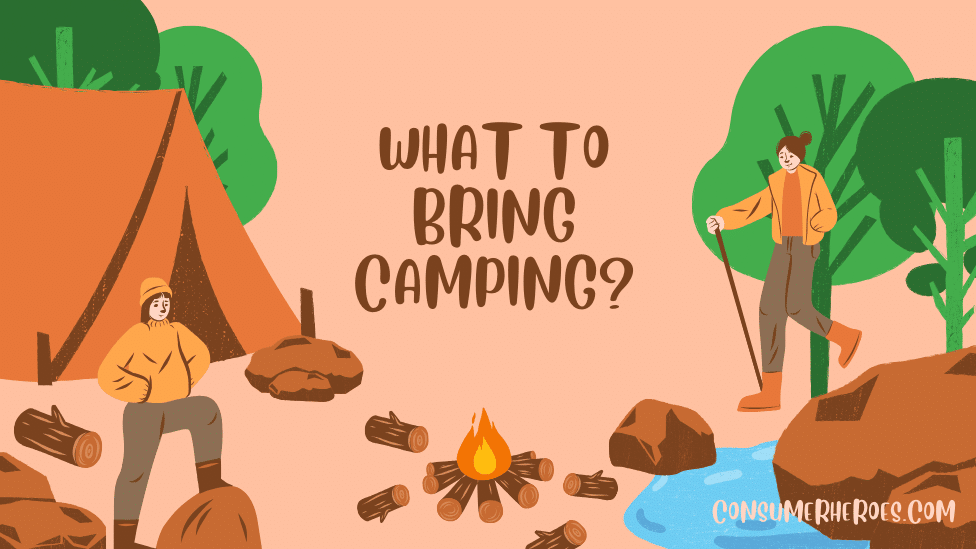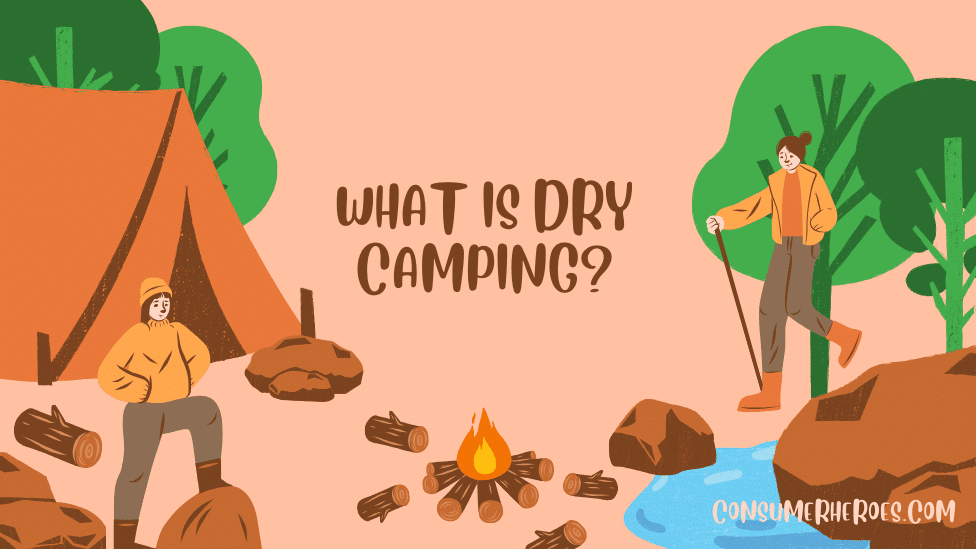Camping can be a fun and exciting activity for people of all ages. However, it is important to be prepared and bring the necessary items to ensure a comfortable and safe trip. Knowing what to bring camping can be overwhelming, especially for first-time campers.
One of the most important things to consider when packing for a camping trip is the weather. It is crucial to bring appropriate clothing for the expected weather conditions, including warm layers for cold nights and rain gear for potential storms. In addition to clothing, it is important to bring proper shelter, such as a tent or camper, to protect against the elements.
Another important factor to consider when packing for a camping trip is food and water. It is important to bring enough food and water for the duration of the trip, as well as any necessary cooking equipment and utensils. Proper food storage is also important to prevent attracting wildlife to the campsite. By being prepared and bringing the necessary items, camping can be a fun and enjoyable experience for all.
Essential Camping Gear
Tent
A tent is one of the most essential pieces of camping gear. It provides shelter from the elements and a comfortable place to sleep. When choosing a tent, consider the size, weight, and durability. A two-person tent is usually sufficient for most camping trips. Look for a tent that is easy to set up and take down, and can withstand wind and rain.
Sleeping Bag
A sleeping bag is another essential piece of camping gear. It keeps you warm and comfortable while you sleep. When choosing a sleeping bag, consider the temperature rating, size, and weight. Look for a sleeping bag that is appropriate for the climate you will be camping in. A mummy-shaped bag is usually the best choice for backpacking, as it is lightweight and easy to pack.
Backpack
A backpack is necessary for carrying all of your camping gear. When choosing a backpack, consider the size, weight, and comfort. Look for a backpack that is large enough to hold all of your gear, but not so large that it is uncomfortable to carry. Make sure the backpack has comfortable shoulder straps and a waist belt to distribute the weight evenly.
Hiking Boots
Hiking boots are essential for any camping trip that involves hiking. They provide support and protection for your feet, and help prevent blisters and other foot injuries. When choosing hiking boots, consider the terrain you will be hiking on, the weather, and your own foot shape. Look for boots that are comfortable, durable, and provide good traction.
Remember that these are just a few of the essential pieces of camping gear. Depending on the specific trip, you may need additional gear such as a stove, water filter, or first aid kit. Always be prepared and pack accordingly.
Additional Camping Equipment
Camping Stove
A camping stove is a crucial piece of equipment for any camping trip. It allows campers to cook meals and boil water without the need for a fire. There are many different types of camping stoves available, including propane, butane, and multi-fuel stoves. When choosing a camping stove, it’s important to consider the size and weight, fuel type, and cooking power.
Water Filter
Access to clean water is essential when camping, and a water filter can help ensure that campers have safe drinking water. There are many different types of water filters available, including pump filters, gravity filters, and squeeze filters. When selecting a water filter, it’s important to consider the filter’s effectiveness, ease of use, and weight.
Camping Chair
A camping chair can provide a comfortable place to sit and relax around the campfire or at the campsite. When selecting a camping chair, it’s important to consider the chair’s weight, durability, and comfort. There are many different types of camping chairs available, including lightweight backpacking chairs, folding chairs, and rocking chairs.
Camping Lantern
A camping lantern can provide much-needed light at the campsite, making it easier to cook, read, and navigate around the campsite after dark. There are many different types of camping lanterns available, including battery-powered lanterns, propane lanterns, and solar-powered lanterns. When selecting a camping lantern, it’s important to consider the lantern’s brightness, battery life, and weight.
Clothing and Personal Items
Weather-Appropriate Clothing
When packing for a camping trip, it’s important to bring clothing that is appropriate for the weather conditions you’ll be facing. This includes clothing for both warm and cold weather. For warm weather, pack lightweight and breathable clothing such as shorts, t-shirts, and tank tops. For cold weather, pack warm layers such as long-sleeved shirts, sweaters, and jackets. Don’t forget to bring rain gear in case of unexpected showers.
Toiletries
Personal hygiene is important, even when camping. Bring a toothbrush, toothpaste, and floss to maintain oral hygiene. Additionally, pack soap, shampoo, and conditioner to keep your body clean. Wet wipes and hand sanitizer are also useful for quick cleanups.
Sunscreen
Even if the weather is cloudy, the sun’s harmful rays can still reach your skin. It’s important to pack sunscreen with a high SPF to protect your skin from sunburn and skin damage. Apply sunscreen generously and frequently throughout the day.
Insect Repellent
Insects can be a nuisance while camping, and some can even transmit diseases. Bring insect repellent to protect yourself from bites and stings. Look for a repellent with a high percentage of DEET or a natural alternative like citronella oil.
Remember to pack all personal items in a waterproof bag or container to protect them from the elements.
Food and Water
Non-Perishable Food
When camping, it’s essential to bring non-perishable food items that will last throughout the trip. These items include canned goods, dried fruits, nuts, and energy bars. It’s important to pack enough food to sustain the campers for the entire trip. A good rule of thumb is to bring enough food for each person for three meals a day plus snacks.
To make meal planning easier, consider using a camping food checklist. This checklist should include all the necessary ingredients for each meal, including spices and condiments. It’s also a good idea to pack a portable stove or grill to cook the food.
Water Bottles
Water is essential for camping, and it’s important to bring enough water to last throughout the trip. Each person should bring a reusable water bottle that can be refilled at the campsite. It’s also a good idea to bring a water filtration system or purification tablets in case the campsite doesn’t have potable water.
Cooler
A cooler is essential for keeping perishable food items fresh. It’s important to pack the cooler with ice or ice packs to keep the food at a safe temperature. The cooler should be kept in a shaded area to prevent the ice from melting too quickly.
When packing the cooler, it’s important to pack the food in the order that it will be eaten. This will prevent the need to dig through the cooler to find the right item. It’s also a good idea to pack the cooler with frozen water bottles, which can be used to keep the food cold and can be refilled as they melt.
Overall, it’s important to plan ahead and pack enough food and water for the camping trip. Bringing non-perishable food items, reusable water bottles, and a cooler with ice will ensure that the campers have enough food and water throughout the trip.
Safety and Navigation
First Aid Kit
When going camping, it is important to bring a first aid kit. This is especially important if you are going to be in a remote area where medical help may not be readily available. A basic first aid kit should include items such as bandages, antiseptic wipes, gauze, adhesive tape, pain relievers, and any prescription medications that you may need.
Compass
A compass is an essential tool for navigation when camping. It can help you find your way if you get lost or disoriented. When using a compass, it is important to know how to read it and to understand how it works. It is also important to keep your compass away from any magnets or other sources of interference that could affect its accuracy.
Map
A map is another important tool for navigation when camping. It can help you plan your route and identify any potential hazards or obstacles along the way. When choosing a map, make sure it is up-to-date and accurate. It is also important to know how to read a map and to understand the symbols and legends used on it.
Multi-Tool
A multi-tool is a versatile tool that can be used for a variety of tasks when camping. It typically includes a knife, pliers, screwdrivers, and other useful tools. When choosing a multi-tool, look for one that is durable and made from high-quality materials. It is also important to know how to use each of the tools on the multi-tool safely and effectively.
Remember, safety and navigation are key when camping. By bringing a first aid kit, compass, map, and multi-tool, you can help ensure that you are prepared for any situation that may arise.
Respect for Nature
When camping, it is important to have respect for nature and the environment. This means taking care of the natural surroundings and leaving no trace behind. Here are some tips for practicing respect for nature while camping:
Trash Bags
One of the most important things to bring when camping is trash bags. It is crucial to pack out all trash and dispose of it properly. This includes food waste, wrappers, and any other trash that is produced during the camping trip. It is important to keep the campsite clean and free of debris to prevent harm to wildlife and the environment.
Biodegradable Soap
Another way to practice respect for nature is by using biodegradable soap. This type of soap is designed to break down quickly and not harm the environment. It is important to avoid using regular soap or other cleaning products that may contain harmful chemicals that can harm the environment.
Leave No Trace Principles
Finally, it is important to follow the Leave No Trace principles when camping. These principles include packing out all trash, minimizing campfire impact, respecting wildlife, and staying on designated trails. By following these principles, campers can help to preserve the natural environment for future generations to enjoy.
In summary, practicing respect for nature is essential when camping. This includes packing out all trash, using biodegradable soap, and following the Leave No Trace principles. By taking these steps, campers can help to protect the environment and preserve it for future generations.







